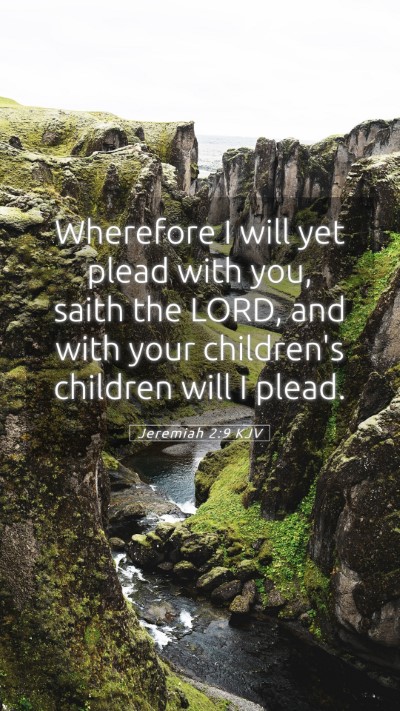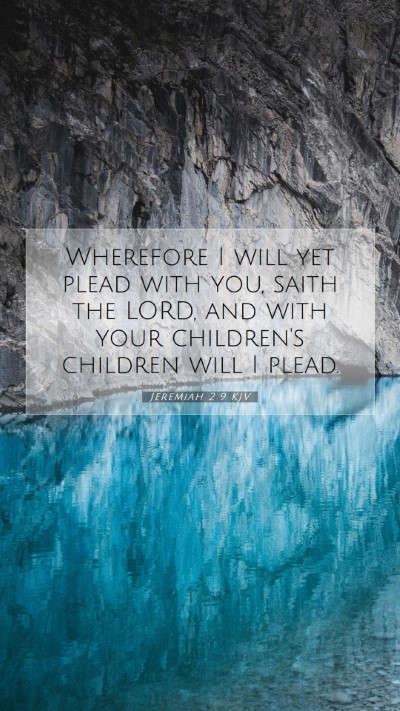Jeremiah 2:9 - Bible Verse Meaning and Commentary
Jeremiah 2:9 states: “Wherefore I will yet plead with you, saith the Lord, and with your children's children will I plead.” This verse reveals God's enduring commitment to addressing the sins of Israel and beckoning them toward repentance.
Contextual Insights
This verse is situated within a larger narrative where God, through the prophet Jeremiah, expresses His lament over Israel's forsaking of Him. The historical backdrop involves the Israelites turning to idolatry and neglecting their covenantal relationship with God.
Interpretation from Public Domain Commentaries
-
Matthew Henry’s Commentary:
Henry emphasizes God’s mercy and willingness to “plead” with His people, illustrating His persistent call to repentance. He notes that God does not abandon His people despite their rebellion, showing His love and justice intertwined. The mention of “children's children” indicates the generational aspect of sin and teaches that the consequences of sin can extend beyond the immediate transgressors.
-
Albert Barnes’ Commentary:
Barnes points out that God’s role as a legal advocate highlights His authority and intent to defend justice. God’s appeal to the children signifies that the message of repentance must be passed down and remains relevant throughout generations. Thus, it serves both as a warning and a promise of hope for restoration.
-
Adam Clarke’s Commentary:
Clarke elaborates on the emotional tone of God in this passage, interpreting it as a divine lament over the spiritual decay of His people. The term “plead” suggests an earnestness in God's heart, reflecting His desire that no one should face the consequences of their sins without a chance of redemption.
Theological Implications
This verse is pivotal in understanding the nature of God’s covenant relationship with humanity. It underscores themes of Bible verse explanations, highlighting not only God’s righteous anger but also His profound love and patience.
Key Takeaways
- God's Faithfulness: Despite Israel's waywardness, God's engagement signifies His commitment to His covenant.
- Generational Accountability: The extension of God’s pleading to future generations serves as a reminder of the lasting effects of sin and the necessity for vigilance in faith.
- Call to Repentance: God’s procedure of pleading emphasizes the importance of turning back to Him and the continual opportunity for redemption.
Application of Jeremiah 2:9
In applying this Bible verse commentary, believers today are called to understand the importance of faithfulness. They should actively engage in Bible study lessons that emphasize turning from worldly distractions and focusing on spiritual restoration.
Modern Relevance
In our contemporary context, this verse challenges individuals and communities to examine their fidelity to God. The cycle of sin that may begin with one generation can set a precedent that impacts future generations. This illustrates the significance of understanding Scripture as it pertains to personal and communal conduct.
Cross References
- Exodus 34:7: Illustrates the theme of sin being inherited and affecting subsequent generations.
- Isaiah 1:18: Calls to repentance and reflects God's willingness to forgive.
- 2 Peter 3:9: Highlights God's delay in judgment as a sign of patience, waiting for people to repent.
In Conclusion
Jeremiah 2:9 serves not just as a historical indictment but as a lively call to all generations to maintain a sincere relationship with God. When engaging in online Bible study or Bible study groups, this passage can spark vital discussions on sin, redemption, and God's enduring grace. Through diligent scripture analysis and Bible study resources, one can derive deeper understanding and application of these critical lessons.
Related Questions
- What does Jeremiah 2:9 mean?
- Explanation of Jeremiah 2:9 in the context of the overall message of Jeremiah.
- Commentary on Jeremiah 2:9 and its implications for today’s believers.


